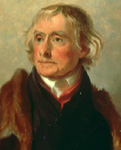
with posterity that the
University would become,
as he put it, "a bulwark
of the human mind."
Thomas Jefferson was a great risk-taker, but he never took a more extravagant chance than when he chose the words "father of the University of Virginia" for his epitaph. In 1826 the University of Virginia was, after all, a collection of raw, barely finished buildings and had just admitted its first class of twenty-six students. Approaching the end of his life, Jefferson could hardly expect to guide this unformed institution to achieve the eminence he envisioned for it.
In essence, Jefferson made a bet with posterity that the University of Virginia would become, as he put it, "an institution on which the fortunes of our country may depend." It was a bet that only posterity could redeem.

institution of wisdom...
we secure it to all our
future generations."
-- Thomas Jefferson
to General James
Breckinridge
February 15, 1821
As we survey the University of Virginia some 170 years later, we find his confidence was justified, thanks to the vision and dedication of alumni, faculty, students, and other friends of the University. Successive generations have adopted Jefferson's dream as their own, contributing time, resources, and creativity to the process. As a result, the University of Virginia has become an institution "worth patronizing with the public support, and . . . a temptation to the youth of other states to come and drink of the cup of knowledge . . . with us."
We stand on the verge of the twenty-first century, widely acknowledged not only as a leader in Virginia and the top public university nationally, but also as an invaluable resource for the nations of the world. Drawing sustenance from our ties to the Commonwealth, we have attained a global reach.
In his eighties, Jefferson knew that it would be up to his successors to fulfill his vision of creating a national university in Virginia.

